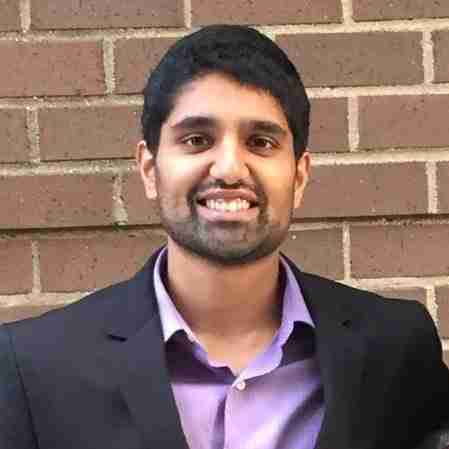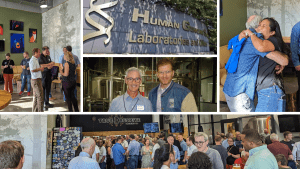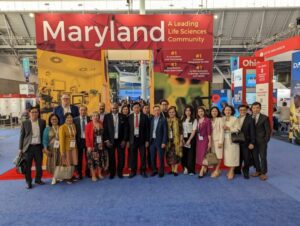
5 Questions With Surya Sundar, Ph.D., Business Development Analyst at Precigen
This article was prepared by the author in their personal capacities. The views and opinions expressed in this article are those of the author and do not necessarily reflect the official policy, opinion, or position of their employer.
“5 Questions With…” is a weekly BioBuzz series where we reach out to interesting people to share a little about themselves, their work, and maybe something completely unrelated. This week we welcome Surya Sundar, Ph.D.
Surya is currently a Business Development Analyst at Precigen, a dedicated discovery and clinical stage biopharmaceutical company advancing the next generation of gene and cell therapies using precision technology to target the most urgent and intractable diseases in its core therapeutic areas of immuno-oncology, autoimmune disorders, and infectious diseases. His role is to facilitate strategic partnerships with key stakeholders; assist in drafting proposals, contracts, and marketing content; track key industry trends; portfolio management; and competitive intelligence. Essentially, he provides industry context to the R&D activities that are ongoing at Precigen to help leadership make strategic decisions with potential partners.
Previously, he worked in External Development, where he was responsible for finding strategic government partners for further development of R&D programs, and developing proposal strategies. He received my Ph.D. from the University of Maryland and did his post-doctoral work at the National Cancer Institute.
In his spare time, Surya volunteers at Bite Me Cancer, which was founded by a 17-year old in 2010 after her own cancer diagnosis, who turned her battle into an all-volunteer non-profit foundation. Bite Me Cancer provides support and inspiration to teenagers battling all types of cancer (through a nationwide Teen Support Bag program among other services) and directly funds thyroid cancer research grants (9 so far).
1) Please introduce yourself to our audience by looking back at your education, training, and career.
I grew up in Northern Virginia and went to college at William and Mary. I got my Ph.D. at the University of Maryland at the Maryland Pathogen Research Institute, studying the effects of sugar metabolism on toxin production. I then did a brief fellowship at the Institute for Bioscience and Biotechnology Research before landing a permanent post-doctoral fellowship at the National Cancer Institute. At NCI, I studied the development of antibiotic persistence and resistance, an issue for cancer patients as they undergo chemotherapy and contract hospital acquired infections. After my post-doctoral fellowship, I worked for just under two years in the government grants and contracts space where I specialized in data analysis and proposal strategy before moving to Precigen.
I started my career in the sciences as an undergraduate researcher during my freshman year of college. I wavered back and forth between research and medicine for some time. I always knew I wanted to work in the sciences from the first-hand effects that diseases have had on my family, not unlike many people who have had similar experiences. I “saw the sign” at the fork in my road when I shadowed an attending in the Pediatric ICU at Georgetown. It was at that time I realized I wanted to move into research to work toward understanding diseases and bring more treatments to patients. This was mostly due to my experience with several pediatric patients, where there were not many treatment options (if any) for the illnesses that they had. I have always loved to solve puzzles and figure out how things work, so I made the decision to become a scientist.
I really enjoyed being at the bench, but realized through all the classes I was taking about the biotechnology industry that finding the right treatment is only part of the battle. There are a whole set of obstacles that remain in place until a patient is actually able to receive treatment. Take the antibiotic market, for example. Regardless of the urgent need, the market makes it difficult to create sustainable programs that allow a business to be profitable. I decided then that I wanted to move away from the bench to truly understand those challenges, and start exploring more roles that would allow me to help more treatments get to people who need them.
2) Business development is a new role for you. What inspired you to go on this career trajectory, and how has the experience been at Precigen so far?
The goal for my career has always been the same: How do I bring the most amount of potentially effective treatments to patients. Initially, I thought that meant working in R&D and developing the next generation therapy that would allow patients to have newer, better options. As mentioned above, I realized how difficult it is even after you discover a potentially life-saving therapy to get it to market. At that point, I thought I would be better served trying to understand how the business of the biotechnology industry works, so I could help get more and more programs through the clinical process to approval. Obviously, doing that takes a lot of money, a proper business infrastructure, and a thorough understanding of the market, hence the move to BD. I still use a lot of my science knowledge, because at the end of the day, you still have to understand the technical details of drug candidates.
Precigen has been fantastic so far. Given the smaller size of the company, I have the opportunity to be involved in different aspects of projects, which has allowed me not only learn more about BD, but about how a biotech company runs in general. The management team is very accessible, which allows me to walk into the office of the Chief or Heads of different departments to ask questions. It makes it much easier to learn quickly. The tradeoff, of course, is that things are always moving quickly and you need to adapt. Personally, I enjoy that because I prefer to be busy, and it has accelerated my development. It is an adjustment not wearing sweatpants every day, though.
3) It’s been almost 5 years since you finished your PhD. Is this the trajectory you expected for your career path, and where do you see the next 5 years taking you?
It is crazy to think it has been that long since I defended. I still remember all the “fun” I had writing my thesis. My friends always give me a hard time because I always talk about my 30-year plan, but in reality it is more of an outline. I have always tried to keep an open mind with the year-to-year trajectory of my career, and steer it within the confines of my “master” plan. I definitely didn’t expect to be in business development once I started my post-doc, but I just kept evaluating where I was and what I wanted. In the end, I’m still driven by the same goal: How can I impact the industry so that families aren’t torn apart by diseases. It always comes down to the patients, and I always keep that in mind as I move forward. That shared vision is what drew me to Precigen.
I hope these next five years allow me to develop like my Ph.D. training did. Those five years really took my scientific training to a more professional level, and so I see my current role doing the same from the business side. My goal is to become as comfortable in the business conversations, by providing input on value, feeling confident in stakeholder outreach, having confidence in my opinions, as I am for scientific meetings. I have learned so much in the six months I have been at Precigen, so it is good to know I’m on track. It is strange to feel like I am back to “training” again in some sense after spending so many years training to become a scientist. However, I feel that sense of excitement learning something new, even if the project requires something as simple as observing and taking notes. It’s like the first PCR or cloning you do in a lab. It won’t win you a Nobel Prize, but you’re learning about what it takes to be a scientist. It’s the same concept here where I’m hoping everything I learn in that time will allow me to become part of a management team or CEO of a company one day.
4) What advice do you have for PhD students and postdocs who are looking to make the jump to a business development role?
I am probably going to reiterate a lot of the points that others have mentioned, but the two keys are to stay informed and network. I would suggest taking some classes on the basics of business or the biotech industry, of which there are several offered in this area. Personally, I took classes at FAES at the NIH, which was taught by local professionals. Subscribe to newsletters about the industry, like the BioBuzz weekly letter, and read as many articles as you can. It is difficult to squeeze in the time when you’re in your last year of your Ph.D. or in your post-doctoral fellowship, but it’s one of the most important things that you can do. It’s hard to jump in without being informed on the current state of the industry.
Another is to start reading annual reports of big pharma companies, as well as following some basic trends in the stock market. I am by no means a finance professional, but it’s important to learn some of the metrics and what they indicate. You have to know what you are looking at when presented with a balance sheet, term sheet, contract, SEC filing, etc.
Second, networking is essential. External facing roles, like BD, require people skills and connections. It’s important to have a healthy network that you can rely on. Remember that you are jumping away from being a scientist into a new world where you don’t have the most experience, so having others that are in a similar position, or were in a similar position can help you navigate your career path. An important note here is that your network should include people in different professions! There is tremendous value in learning about other people’s perspectives.
5) And…because you’re still a microbiologist at heart – if you could be any type of bacteria in the world, what would you be and why? 🦠️
Incredibly biased, but Group A Streptococcus (GAS) for sure. They grow in chains, which would make being a bacterium more enjoyable because I would have a close community. They have very extensive sugar metabolism systems and toxins that degrade host tissues for food, and I love to eat. I’m fascinated by castles, so being gram-positive would make me feel like I had my own thicker wall on the outside (although I’m not sure what the moat would be). My favorite color is blue, so the purple in a Gram-stain is pretty close. And finally, I would want to be versatile depending on what my environment was, which GAS tend to be. I think many of these apply to a lot of bacteria, but you always develop a special attachment to the bacteria you studied for your thesis!
Now if you asked my family, they would say any thermophilic bacteria since I get cold very easily, and prefer the heater be on the highest setting all winter. I do like the summers in D.C., so maybe they are right.
- About the Author
- Latest Posts
BioBuzz is a community led, experience focused, biotech and life sciences media and events company. BioBuzz highlights regional breaking news, industry professionals, jobs, events, and resources for business and career growth. Their weekly newsletter is subscribed to by thousands in the BioHealth Capital Region and Greater Philadelphia as the go-to for industry updates.




